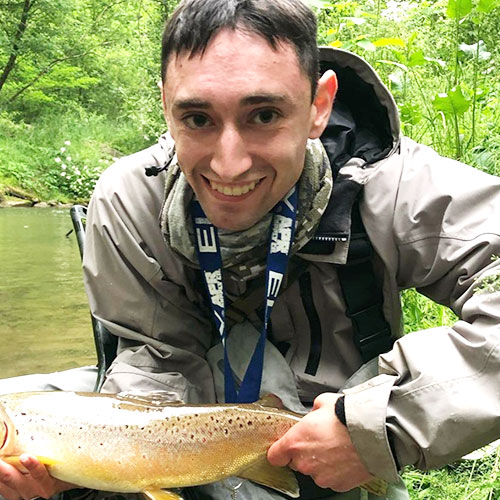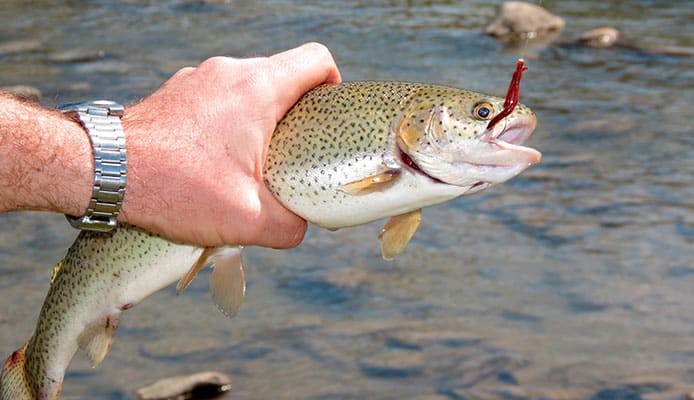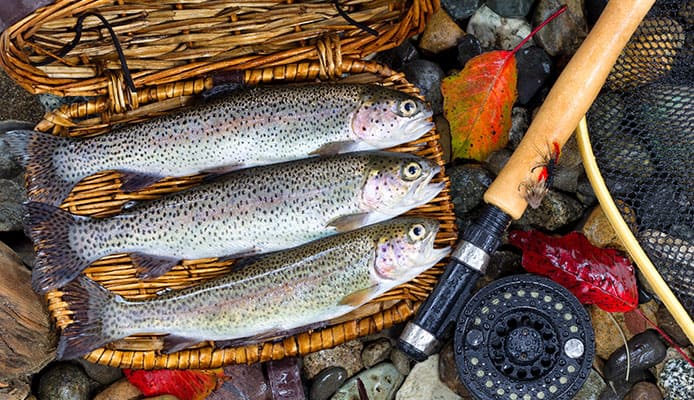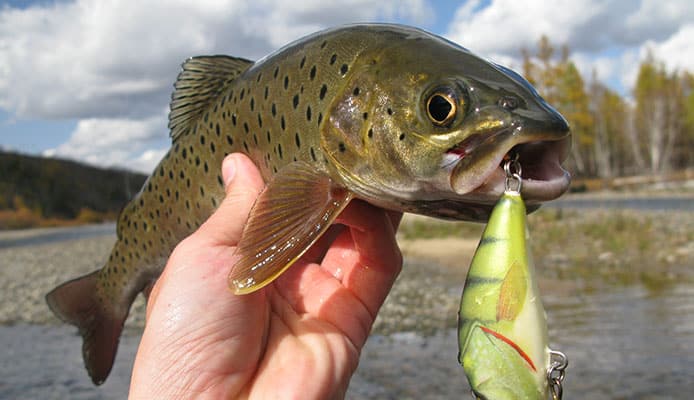
-
1.
-
2.
-
3.
-
4.
-
5.
Trout are opportunistic feeders that have a widely varied diet and can be fished using a variety of lures, baits, and flies. However, they are also very picky eaters. To improve your catch rate, catch trout more consistently and even land some trophy game, it is important to ensure you have the best trout lures in your tackle box.
Trout fishing being one of the most popular angling pastimes, there’s no shortage of trout lures in the market. Presented with all the options, it is impossible to decide what the best lure to use on trout is just by looking at the various types, colors, shapes, and shiny reflections.
The smart approach is to go with what has already been tested and proven to work. To get you started, below is a list of 10 best trout lures that fishes find irresistible. They have repeatedly proven their trout catching effectiveness as stream, pond, rives, and lake trout lures.
Ready to get started? Let’s go.
OUR TOP PICK
Acme Kastmaster Trout Lure
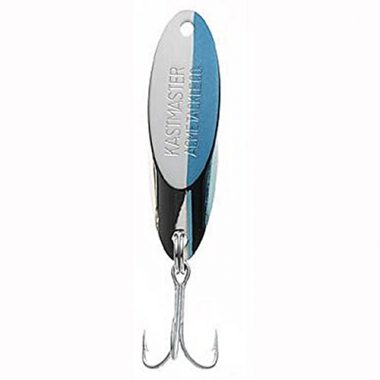
- What Makes This Trout Lure Stand Out
- Effective action
- Great casting distance
- Durable and doesn't break, corrode or lose luster
- Extremely versatile
- Easy to use
- Suitable for saltwater fishing
- Inexpensive lure
- The wide range of colors and weights
EDITORS CHOICE
Dynamic Lures Fishing Trout Lure
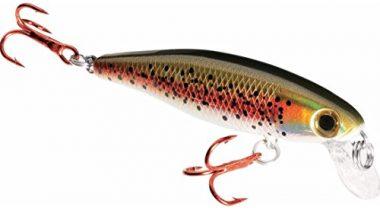
- What Makes This Trout Lure Stand Out
- Real life look and optimal weight
- Easy to cast and good casting distance
- Effective and versatile action
- Cheap with a good build quality
BEST VALUE
Berkley Powerbait Extra Scent Glitter Trout Lure
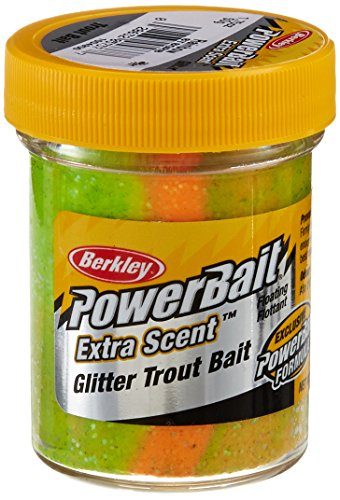
- What Makes This Trout Lure Stand Out
- Irresistible scent and flavor
- Glittery for enhanced visibility
- Good shelf life
- Easy to use and effective
- A wide range of colors
Plusinno Fishing Lures 16pcs Spinner Trout Lure
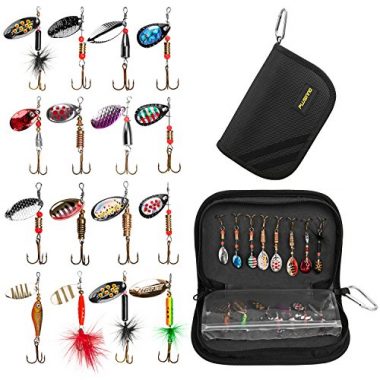
- What Makes This Trout Lure Stand Out
- Nice selection of spinners
- Effective lure action
- Freshwater and saltwater use
- Carry bag for portability
- Incredible value
Berkley PowerBait FW Power Floating Worm Fishing Trout Lure
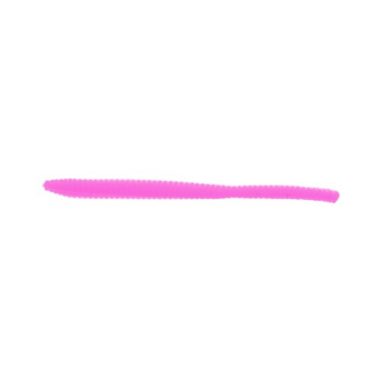
- What Makes This Trout Lure Stand Out
- The wide range of colors
- Life-like presentation and action
- High-quality bait for trout
- Bright color and enhanced with scent and flavor
Panther Martin Holographic Spinner Trout Lure
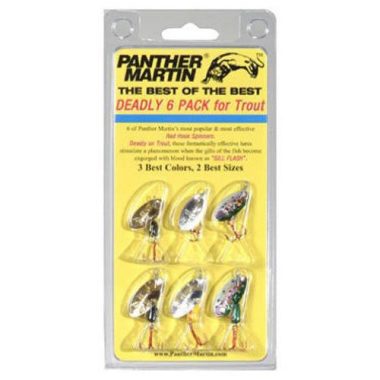
- What Makes This Trout Lure Stand Out
- All time best trout lure that's reliable
- A pack of six spinners to suit different conditions
- Kit has the most effective colors and sizes
- Good quality and durable
Truscend JerkQueen Fishing Trout Lure
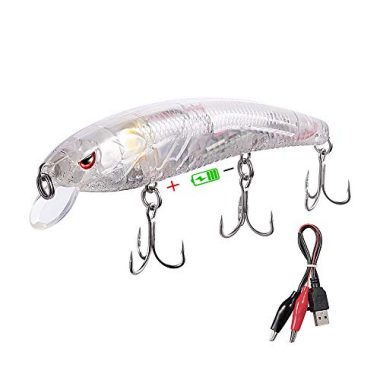
- What Makes This Trout Lure Stand Out
- Flashing and vibrating lure
- Realistic look and action
- The wide range of colors and sizes
- A versatile lure for freshwater and saltwater use
- Rechargeable LED for day and night
LotFancy 30PCS Inline Spinner Baits for Trout Lure
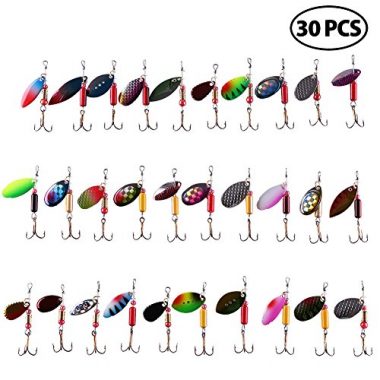
- What Makes This Trout Lure Stand Out
- Versatile 30pcs kit
- Assorted colors and sizes
- Good action in the water
- Inexpensive and great value
Truscend Fishing Lures Crankbait Jointed Trout Lure
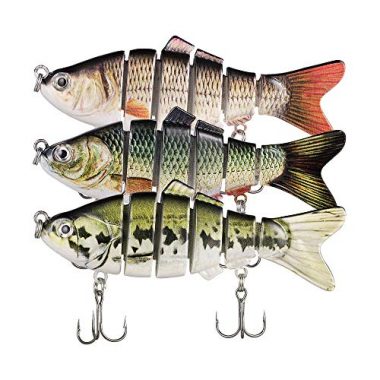
- What Makes This Trout Lure Stand Out
- Realistic design and actions
- Well made and durable
- Works on a wide range of species
- Saltwater and freshwater application
- Hard and soft models
Rebel Lures Crickhopper Fishing Trout Lure
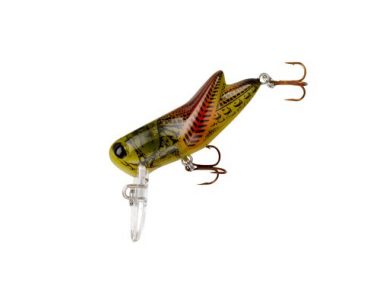
- What Makes This Trout Lure Stand Out
- Perfect size for trout
- Realistic looks and actions
- Topwater lure as well as a crankbait
- Effective on a wide range of species
How To Choose The Best Trout Lure – Buying Guide
Trout lures come in all kinds of shapes, colors, and sizes. It is said that manufacturers make trout lures not just for trout’s eyes but also to catch the eyes of trout anglers.
The above are some of the best trout baits and they work very well at catching trout as long as they are fished properly. However, there is no one perfect lure that works all the time, on all trout, and for all kinds of fishing situations.
To help you pick the right kind of terminal tackle that will suit the diet and feeding tendencies of the trout you will be targeting, water conditions, time of year, and how you will be fishing, here’s a guide to the best trout fishing baits and lures.
Type
Trout have a varied diet and the types of lures and baits that can be used to catch them are just as varied. The first step to choosing the best trout lures is to learn what their favorite foods are.
Small trout eat insects while large trout that are over one foot long mostly eat smaller fish, worms, frogs, and larger insects. Stocked trout are fed pellets.
Related Reviews: Topwater Lures & Frog Lure
The best trout fishing bait is what they eat. Minnows, worms, salmon eggs, power bait, larvae, nightcrawlers, crickets, grasshoppers, marshmallows, and small fish are all among the best fishing baits for catching trout. For example, the best rainbow trout bait will consist of small fish, larger insects, and worms. Be sure to check your state’s regulations on using live bait to catch trout.
The best types of trout lures are realistic imitations of their favorite food in terms of shape, color, and behavior in water. There are all kinds of lures designed to imitate small fish, insects, and other organisms that trout feed on. Since trout have very good eyesight and are very responsive to bright colors, flash, and sonic vibrations, their lures are also designed using colors, flash, movements, and reflective elements that will catch their eye.
Trout lures that have proven to be very good include spinners, spoons, minnow plugs, dough bait, swimbaits, worms, and insect imitators. Stick baits, crankbaits, jerk baits, and jigs also work well when used correctly. If you practice fly fishing, dry flies and wet flies are effective especially for wild trout, as bugs are part of their diet.
Related Reviews: Flies For Trout & Crankbaits For Bass
Pieces
Trout can be very unpredictable in their response to lures. Sometimes they just aren’t in the mood to bite what they’ve always bitten. It is always wise to have an assortment of trout lure pieces in your tackle box so you can try other lures if they just aren’t biting what you’ve been presenting.
Different trout lures also exhibit different actions in water to suit different moods and conditions. Having a diverse collection lures means you can choose the best trout lures for the current conditions.
Size
Compared to other game fish, trout are not very large and they have small mouths. Their prey is also smaller and they are usually fished using smaller trout lures that also suit the light and ultralight tackle and lines of 4 to 10-pound test typically used in trout fishing. The lure size you need will depend on the water depth and conditions. The general rule is to go bigger the deeper the water gets.
For example, you can use size 1 and 2 spinners in shallow waters and small streams and sizes 2 to 9 for deeper waters, long-distance casts, or when targeting large trout. Flies sizes usually range from two to five inches. Coldwater makes fish sluggish and smaller trout lures presented slowly are more effective.
Material
Trout have excellent eyesight. They can not only see the colors we see, but they can also see other colors in the UV spectrum that aren’t visible to us. Bright colors, flash, and certain motions catch their eye and trigger their predatory instinct. They also detect sonic vibrations very well. The best trout lures are realistic in shape, color, and action on the water.
Silver is shinier than gold followed by copper, bronze, brass, and nickel. Nickel and silver look the same to the naked human eye but nickel is much less reflective to trout’s eyes. In unclear and cold waters, you will need more flash so you can use a lure with silver or chrome on one side and fluorescent orange, green or yellow on the other. In clear and warm water, natural-looking and less reflective is better.
For durability, look for trout lures made using metals like machined brass and steel or hardened ABS plastic. Corrosion resistance is a must for saltwater fishing.
3D Eyes
If a lure is to be effective on trout, it is important that it looks like the real thing. 3D eyes play a very important role in this. Realistic 3D eyes are sure to catch the attention of trout and prompt them to strike. The most realistic 3D eyes have tricolor designs and oval-shaped pupil just like a real fish eye.
Weight
When deciding on what weight of the lure to use, consider what kind of fishing rod setup you will be using and the water depth and conditions. Trout are usually fished using light to ultralight tackle which calls for lightweight lures. Heavier trout lures are required when fishing in deeper waters, stronger currents, and windy conditions. Lightweight surface lures work better in shallow depths and calm waters. Slightly deeper waters call for a weighted option that will hang just below the surface.
Treble Hooks
Given their good eyesight and wary nature, trout can detect hooks easily and notice that something isn’t natural. Smaller more discrete hooks are more effective and so are those hidden in the fur. It is always best to choose the smallest hook size possible depending on the size of the bait you’re using and the size of trout you’re targeting.
Treble hooks have three points with a common eye and can be very effective at catching trout. The downside is that small treble hooks are deadly as trout tend to swallow them and die. You can use size 14 and 16 when you plan to keep your catch. If you practice catch and release, larger size #10 and #12 treble hooks are safer. Always check your state’s regulations regarding the use of hooks and bait tactics to see if small treble hooks are legal.
FAQs
Q: Why Do I Need A Special Trout Fishing Lure?
As a species, trout are unique and have their preferred diet and feeding habits. They are opportunistic predators but can be very careful and selective in what they eat. Trout respond to bright colors, sonic vibrations, flash, and certain movements.
This is why you need a special trout fishing lure that imitates their favorite food in shape, color, and even behavior in water and is designed in such a way as to catch their senses. Not even all trout and trout habitats are the same. You also need a variety of special trout lures to suit different fishing locations, water conditions, and seasons.
Q: Can I Reuse The Lure?
Yes you can. Part of the convenience of trout fishing using lures over live bait is that artificial trout lures can be reused over and over again. As long as they are not snagged or damaged so they are still effective at fooling trout into believing that it is the real thing, all you have to do is wash them and store them ready for your next fishing excursion.
Q: How Do I Clean The Lure Before And After Use?
Before using a lure, it is important to ensure it is in good condition so it will look and act like the real thing. You can rinse the lure in freshwater and then dry it before using it to lure fish. It is also important to store your lure clean and dry so it is in good condition for the next time you need it. After use, clean the lure gently using water, a gentle soap, and a soft toothbrush. Rinse it and dry it thoroughly before storing it in a tackle box.
Globo Surf Overview
The kind of lures you use can determine whether you have a successful day on the water or go home empty-handed. The most effective strategy is to know the trout you’re targeting and acquire lures that realistically replicate what they prefer to eat under different conditions. By filling your tackle box with the best trout lures and bait and using the right presentations, you will have more success catching trout and get the most out of your time spent on the water.
More Fishing Reviews:
- Fishing Shorts
- Trolling Rods
- Saltwater Fishing Rods
- Ultralight Spinning Reel
- Kids Fishing Poles
- Hooks For Catfish
- Fly Fishing Waders
- Fishing Pants
- Crab Traps
- Tackle Box
More Lures Reviews:
- Musky Lures
- Largemouth Bass Lures
- Smallmouth Bass Lures
- Saltwater Lures
- Salmon Lures
- Ice Fishing Lures
- Freshwater Lures
Which of the trout lures in our list do you plan to try? We would love to read your thoughts or experience with the trout lures we’ve reviewed! Let us know in the comments below!


